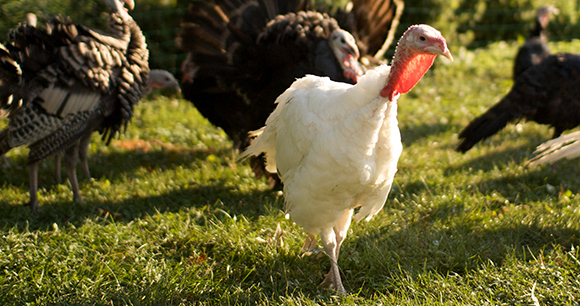
Washington, DC—As families start shopping for their Thanksgiving menus, a new survey commissioned by the Animal Welfare Institute (AWI) finds that a majority of poultry purchasers think conventional turkey production practices are unacceptable.
According to an online survey conducted by The Harris Poll among more than 1,700 US adults who purchase poultry products at least once a month, 70 percent said it was totally or somewhat unacceptable for conventional turkey producers to deny these animals access to fresh air and sunlight. More than 3 in 5 of these poultry purchasers found it totally or somewhat unacceptable that producers confine turkeys indoors for their entire lives (64 percent), expose the animals to continuous, artificial light for 20 hours a day (61 percent), subject them to beak trimming and other physical alterations without pain relief (63 percent), and use growth promoters or non-therapeutic antibiotics to raise them (61 percent).
“Families are increasingly demanding more compassionate food options when gathering for the holidays, yet the vast majority of birds found on supermarket shelves continue to suffer in overcrowded, disease-ridden factory farms,” said Dena Jones, farm animal program director for AWI. “Fortunately, there are higher-welfare poultry alternatives and plant-based options that can easily be incorporated into your favorite recipes without subjecting farm animals to a grim existence.”
Each Thanksgiving, 85 to 90 percent of people nationwide collectively consume an estimated 46 million turkeys, according to the National Turkey Federation. It takes an informed consumer, however, to sift through the number of misleading turkey labels sanctioned by the US Department of Agriculture.
In many cases, turkeys in industrial systems breathe in dangerous levels of ammonia and suffer from health and welfare problems resulting from selective breeding for rapid growth and high meat yield. Despite mounting public opposition to such practices, turkeys are often forced to endure painful mutilations to prevent feather pecking, cannibalism, and other aggressive behaviors due to crowding and stress.
The inhumane treatment of turkeys continues upon leaving the farm. During transport and before reaching the slaughter line, thousands of birds experience heat or cold stress, starvation, dehydration, suffocation, or death from blunt force trauma, according to USDA inspection records. AWI and Farm Sanctuary sued the USDA last year for failing to require humane handling of poultry at slaughter, which causes birds to suffer excruciating deaths and can compromise food safety and meat quality. Last month, a federal judge ruled that the lawsuit may proceed after the USDA moved to dismiss it.
To help consumers better evaluate their food choices, AWI provides a comprehensive guide to animal-raising claims commonly found on meat, egg, and dairy products. The guide divides claims about how farm animals are raised into “best choices,” (such as Certified Animal Welfare Approved by AGW and Global Animal Partnership, Steps 4, 5 and 5+), along with “next best choices,” “fair choices,” and “beware of these labels” (including “cage free” and “no added hormones” for turkeys and chickens raised for meat, and “natural” for all animal food products). And, of course, one can simply leave turkey off the plate. A growing number of Americans are celebrating the season with cruelty-free, plant-based protein options.
Marjorie Fishman, Animal Welfare Institute
[email protected], (202) 446-2128
The Animal Welfare Institute (awionline.org) is a nonprofit charitable organization founded in 1951 and dedicated to reducing animal suffering caused by people. AWI engages policymakers, scientists, industry, and the public to achieve better treatment of animals everywhere—in the laboratory, on the farm, in commerce, at home, and in the wild. Follow us on Facebook, Twitter, and Instagram for updates and other important animal protection news.
Survey Method
This survey was conducted online within the United States by The Harris Poll on behalf of the Animal Welfare Institute from October 12-14, 2021 among 2,019 US adults ages 18 and older, among whom 1,733 purchase fresh, frozen, or processed poultry products at least once a month. This online survey is not based on a probability sample and therefore no estimate of theoretical sampling error can be calculated. For complete survey methodology, including weighting variables and subgroup sample sizes, please contact Dena Jones.